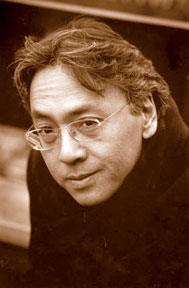The noble servant –Kazuo Ishiguro’s ‘Stevens’ in The Remains of the
Day
By Dilshan BOANGE
(Part 3)
Defining the distinctions of ‘distinguished’
On his conceptualization of the theorem of what constitutes a butler
to be one that can be viewed as a ‘great butler’, Stevens presents a
number of aspects that can be treated as characterising a butler worthy
of being thought of as exponential and at the very apex of the
profession and thereby a venerable figure who should be thought of as an
uppermost role model.

|

Kazuo Ishiguro |
Citing the Hayes Society’s criteria for membership is where Stevens’
deliberations on the matter begin with deep focus at the very start of
the chapter titled –Day Two Afternoon, Mortimer’s Pond, Dorset.
The Hayes Society seems to be a guild of sorts, of professional
butlers, and sets down certain guidelines to consider where the standing
of a butler would be in terms of his professional status.
This association has a certain set of criteria to be met for an
applicant to be considered for membership and the primary of them is
that ‘the applicant be attached to a distinguished household’ it is this
very primary requirement that Stevens questions to embark on his
contemplative deliberations to present his views on the matter. His
analysis begins with critiquing what might be interpretable by the term
‘distinguished household’.
Analyzing this term which is at the crux of the definitive is what
marks a discourse on the part of Stevens to elaborate from a point of
personal views and convictions of how values and ideals that are bound
with generationally marked perceptions come into play.
Stevens tells the reader that what constitutes the notion of
‘distinguished’ would not be one and the same as with his generation of
professional butlers and that of the preceding generation being of
course that of his father.
The factors of distinguishing the ‘distinguished’ is presented in
relation to how English society views (upward) mobility within the class
system. Stevens says that his father’s generation viewed the society as
being hierarchical in the very classic sense of the system with the
monarchy and the nobility with its peerages forming the apex and then
the rest following the line downwards where the primary factor to mark
‘distinction’ was birth and thereby the business class would always rank
lower than the peerage holders. Stevens however presents the reader with
what seems a far more liberal outlook on the matter where his views
include certain ideals that are linked with the belief of social
progress being part of the picture.
Serving those who serve progressiveness
“Where our elders might have been concerned with whether or not an
employer was titled, or otherwise from the ‘old’ families, we tended to
concern ourselves much more with the moral status of an employer. I do
not mean by this that we were preoccupied with our employers’ private
behaviour. What I mean is that we were ambitious, in a way that would
have been usual a generation before, to serve gentlemen who were, so to
speak, furthering the progress of humanity.” With these words it is
evident that Stevens views favourably towards progressive movement in
society and further states that he believes that he finds a ‘worthier
calling’ to serve a gentleman who would have been of humble beginnings
and not donned with titles if he was one whose work contributed better
to the wellbeing of humanity. This is held by Stevens to be worthier
than to serve an employer whose only virtue would be the laurels of high
birth and idles his time away in unproductive luxuriating and indulgence
and thereby represent the quintessential ‘decadent feudalist’.
Therefore, it is evident that the views of Stevens and what he
appears to present as his generation had ideals that clearly mark a
sense of nobleness in them when one looks at the ideal that they held as
convictions.
By being in the service of such gentlemen whose efforts help the
furtherance of humanity’s wellbeing ones such as Stevens believes that
they too serve a noble cause and have contributed to the larger picture
in some modest way.
Another interesting aspect in the views of Stevens in this line of
discussion is how he presents his views on the structures of power
dynamics in society. From the hierarchical setup that was perceived by
his father’s generation, Stevens says that he comprehends the structure
to be more of a wheel with the power holders whose decisions shape the
world of tomorrow at the very centre forming a ‘hub’ with the rest
forming the outer sphere, and one may presume in concentric placement
occupy proximities from the centre. It is with this scenario in mind
that Stevens indicates that this over the stringent hierarchy view
allows more mobility through progressive developments to those who are
in the outer ground to come closer to the centre and indeed in the case
of commoners who rose up to be great statesmen become part of the ‘hub.’
Stevens’ outlooks of society as a ‘wheel’
Stevens’ conceptions of the structure of society in the more
progressive developments of England through the ‘wheel’ simile has stark
resonance of the ‘centre and periphery theory’ that illustrates the
systems of capitalist production in the global context. The centre and
periphery theory is also an approach to analyze international affairs in
the discipline of International Relations especially within the areas of
imperialism and colonialism.
It can also be viewed as a theoretical approach in the post-colonial
context to assess the levels of independence that a post colonial nation
would have (or not). Of course whether or not Ishiguro intended to
reflect this theoretical grounding and thereby make a statement of
imperialist/colonialist mindsets of England is another matter for
debate. The allusion to the centre and periphery theory based on Stevens
‘wheel’ analogy is of course what one may read into the text as a
reader.
What is commendable about the character of Stevens in this line of
discussion of commentary and analysis is that Stevens is one firmly
entrenched in his values and ideals and aspires through his profession
to serve a higher cause one in which he sincerely believes as salubrious
rather than be preoccupied with how best to make profit of his skills by
marketing himself to the best paying employer.
In the chapter titled –“Day Three –Morning Taunton, Somerset” Stevens
clearly indicates that he does not believe that to the ideal of his
professional skills being for the service of that may which serve a
worthier cause, as fanciful.
“There are a certain number of our profession who would have it that
it ultimately makes little difference what sort of employer one serves;
who believe that the sort of idealism prevalent amongst our generation
–namely the notion that we butlers should aspire to serve those
gentlemen who further the cause of humanity –is just high-flown talk
with no grounding in reality.” And in the course of serving the persons
whom the likes of Steven believe to be furthering the cause of
humanity’s wellbeing, Stevens displays what is a most noble trait and
one hard to come across in employees –loyalty.
|

